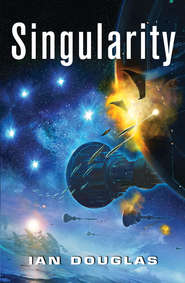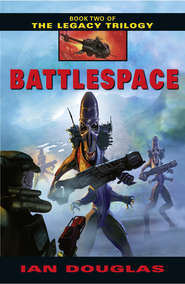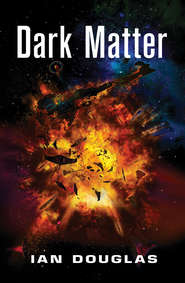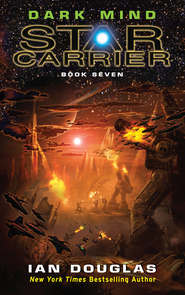По всем вопросам обращайтесь на: info@litportal.ru
(©) 2003-2024.
✖
Star Marines
Настройки чтения
Размер шрифта
Высота строк
Поля
Battlespace
1508 hrs, GMT
Garroway felt his gut twist as the autie spun end for end. The image of the objective didn’t change, of course, since it was coming from a remote drone. At least they had an image now; from the drone’s vantage point, it looked as though the XEL lasers had burned another hole into the Xul giant, roughly amidships.
A flashing red light illuminated the autie’s cargo deck—warning that the compartment was now in vacuum. For several minutes, now, the atmosphere had been bleeding away into storage tanks belowdeck. The Marines did not want to have to deal with the explosive effects of sudden decompression when the aft hatch opened up.
Acceleration slammed again into Garroway’s chest, and he heard the stifled gasps of several other Marines on the platoon channel. The autie was decelerating hard, backing down toward the objective as it fell stern-first, killing its residual velocity.
He found himself fervently hoping that the navigational AI piloting the autie knew what it was doing. Inertialess field or no, if they hit the Xul vessel too fast, all the Oannan technology in the Solar System wouldn’t keep them all from being reduced to bloody paste inside their armor—Spam in a can, as the old saying put it.
He wondered what Spam was. It didn’t sound pleasant.
To take his mind off that claustrophobic image, he checked his Hawking 34mm chaingun—again. The Preble, fortunately, had been carrying a store of live ammo, including cases of 34mm rounds, both AP and HE, and the Navy ratings had passed what they had down into the autie en route. Unfortunately, the supplies of expendable ammo were sharply limited—only about a thousand rounds per man. That meant the Marines’ ammo bins were less than a third full.
Still, it was better than going into live combat with training rounds. And the team’s pig-gunners all had fresh power packs. His chaingun loadout gave him a standard AP-HE three-to-one ratio—three rounds of armor piercing, followed by one of high explosive, a mix guaranteed to cut through just about anything a human opponent could throw at them.
Of course, these were not human opponents. He tried not to think about the possible consequences of that, either.
The deceleration went on for a long time. At the last moment, as his vision started to blur, Garroway saw the autie on the drone feed, a tiny bright star moving fast—too fast—toward the gaping hole in the Hunter ship’s flank.
Hell, where was the external feed from the autie? There ought to be a camera up, to show them where they were going … but there was no time to think about that.
“Brace for impact!” he called over the platoon channel.
In the image window in his mind, the star vanished into the far vaster mass of the Xul ship, slicing through tangled wreckage. The jolt slammed him back against the seat, nearly driving the breath from his body. The impact was silent in hard vacuum, of course, but he could feel the shuddering, grating vibrations of hull metal sliding through whatever the hell the Xul vessel was made of, transmitted through deck and seat.
And then he felt the familiar dropping sensation of zero gravity. The seat grabbers released him, and he flexed his body, drifting into the aisle between the seats, which now felt more like a tunnel, with no up or down, no deck or overhead. “Okay, Marines! Stand up! By twos! Secure your drift!”
The tunnel began filling with armored Marines moving gently out of their seats and turning to face aft, gripping the seat backs in gauntleted hands to keep from floating free. Aft, the main hatchway was opening up, the ramp swinging slowly out of the way. Peering past the shoulders of the Marines in front of him, Garroway could see … blackness. An empty cavern.
At least the hatch is opening, he thought. If the mechanism had been damaged by the autie’s tail-first impact, they would have had to emerge one at a time from the single-man hatches forward, an awkward and deadly way of entering combat.
“Ramp down!” the autie’s crew chief yelled. “You’re clear to go!”
“Okay, Marines,” Garroway called. “It’s going to be a close-quarters tangle in there. Weapon status on safety-interrupt! Acknowledge!”
Acknowledgments came back in rapid succession. With safety-interrupt engaged in their combat suit computers, their weapons would lock each time their line of fire intersected a fellow Marine.
“Boarding party away!” Garroway called. “Gung ho!”
The ancient battle cry was a contraction of a Chinese phrase, gung-ya hod-za, meaning “everyone pull together,” a beloved relic of the Corps’ deployment into China during the early twentieth century. In this case, pull together was meant literally. Gripping the seatbacks, the twin line of Marines had to haul themselves along, everyone moving in perfect unison to avoid colliding with one another. The bulky, two-meter suits, heavy with external armament and ammo bins, were tricky to maneuver in zero-G. By all pulling at the same time, the two lines of Marines propelled themselves forward, looking, as Garroway liked to think of it, like an enormous black millipede.
They exploded from the open rear ramp, exiting the claustrophobic confines of the AUT and emerging in a vast and partly empty volume of space. The shuttle had backed into the crater burned into the Xul vessel, pushing in through a tangle of what looked like girders or struts and coming to rest in a spider web of twisted beams. Whatever had been in here had largely been reduced to wreckage and debris. Huge masses remained, but so blasted and melted that it was impossible to tell what those masses had been.
At optical wavelengths, the space was in complete darkness, but Garroway’s infrared sensors showed the walls and debris within the hole still glowing in eerie reds and oranges. Some of the wreckage was still molten, in fact, and it looked as though the white-hot plasma from the autie’s thrusters had added to the fiery destruction. Beyond the trapped autie, through the gaping hole in the Xul ship’s side, he could see the stars outside.
“Now that’s what I call a fucking preliminary bombardment!” Chrome yelled over the platoon channel. “Section Two! Follow me!”
They’d sketched out their tactical deployment during the hours of transit as part of the Preble’s cargo. Half of the Marines peeled off and began moving aft within the Xul wreckage, hauling their way through the debris where they had to, using their suit thrusters in open space. Daugherty and Hoyer were with her, hauling two of the nukes.
“Section One!” Garroway called out. “With me!” His suit’s AI oriented him with the forward end of the Xul vessel, painting a targeting cursor on the cavern wall in that direction. He pushed off from a twisted, sullenly glowing girder. On his tactical readout, he saw fifteen of the Marines following him. Lowey, Istook, and Sergeant Ortiz were close behind him, carrying first section’s allotment of nukes. They had a long boost through relatively empty space—almost two hundred meters—to reach the charred and twisted ruin of the cavern’s forward wall. For a long moment, they drifted through empty space. Then, using a much-practiced maneuver, they tucked and twisted, turning so that they were drifting feet-first.
ZGM—Zero-Gravity Maneuvering—was endlessly practiced by Marines assigned to space billets; arguably, that was what distinguished Fleet Marines from the ground-pounders. Garroway’s boots hit the wall, and he allowed himself to crumple with the impact, absorbing the energy in his legs and back to avoid rebounding back into the cavern.
The other Marines came in around him, silently falling into the wall; two, Atkins and Freemont, bounced, drifting back into the cavern, but their buddies grabbed hold of their harnesses before they floated out of reach and hauled them in. Garroway made a mental note to talk to them later about scheduling additional ZGM training.
If there is a later, he reminded himself. So far, the Xuls hadn’t paid any attention to the tiny force of Marines crawling around in the savaged bowels of their ship. But that would change.
“Istook, Ortiz, Lowey,” he said. “Texten up! Engage triggering sequence Alpha. Confirm!”
“Trigger sequence Alpha confirmed,” Ortiz told him.
“Alpha confirmed,” Lowey said.
“Sequence Alpha, confirmed,” Istook added.
Sequence Alpha was controlled by their individual suit AIs. It armed the backpack nukes, setting them to detonate if—and only if—Garroway or Chrome, or Wilkie back on board the autie, or General Garroway back on board the Preble, transmitted a coded radio signal. It was a form of mission insurance. If every member of the boarding party was somehow and suddenly killed, the nukes in their CAS backpacks could still be fired.
Garroway wasn’t sure he entirely trusted Wilkie’s mental thumb on the destruct switch. He hated admitting that to himself, but … there it was. The idea of having a nested set of destruct sequence go/no-go triggers was so that if Chrome and Garroway both bought it in the next few minutes, Wilkie could decide whether or not to trigger the nukes immediately, based on the status of the rest of the assault force. If the AUT was destroyed in the next few moments, and Wilkie with it, the decision would revert to Uncle Clint.
He trusted his uncle. Wilkie, he did not … not entirely. It wasn’t that Garroway thought the guy would push the button on the RST deliberately, but the guy could panic. If he did, he might transmit the firing code before the rest of the Marines could get clear of the Xul vessel, might trigger the nukes even before the autie got clear. That, in fact, was his responsibility if it looked like the mission would otherwise fail.
Cool heads were needed to make that kind of call. And Garroway just wasn’t convinced that the twenty-seven-year-old Wilkie had the prerequisite chill to the organic component of what was stuffed into his skull. He worried too much.
And this wasn’t the time to worry about Wilkie’s worrying. “Lowey!” he said. “Plant your boom-pack here. The rest of you, look for an entrance, some way to get into the ship.”
“Aye, aye, Gunnery Sergeant.”
He helped Lowey fasten the backpack nuke to the cavern wall, using a nano sealant that bonded tighter than any weld. “Okay. Set the timer. Sequence Bravo.”
He watched as he placed his left gauntlet on the pack’s contact plate and fed the Bravo code into the weapon’s computer.
“Charge ‘Whiskey’ is in place,” Garroway announced over the platoon channel. “The clock is running.”
The five nukes had been given the last five letters in the phonetic alphabet—Victor, Whiskey, X-ray, Yankee, and Zulu. The Bravo sequence would detonate the weapon in two hours, unless it received a coded order to revert to Alpha, or to proceed to Charlie.
“Hey, Gunny!” Corporal Hoeffel called. “We got movement!”
Direction was indicated on his tactical feed. Garroway rotated his CAS in space, searching the indicated direction. Yes … there it was.
He wasn’t at first sure of what he was seeing, exactly. It looked as though some of the masses of half-molten metal, the remnants of hull and bulkheads, were growing, with new pieces being extruded from the old. And … he could see a cloud moving past the stars visible through the opening in the hull, like a swarm of gnats or locusts. As he watched, the swarm appeared to solidify in places, filling in gaps and emptiness.
Swiftly, inexorably, the Xul ship was repairing itself.
Battlespace
1537 hrs, GMT











